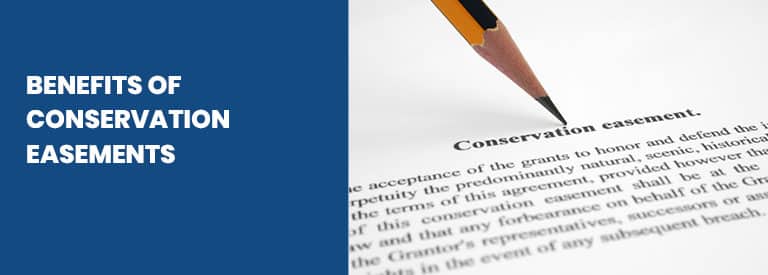Each profession has a unique language. As a layperson, it’s difficult to understand a conversation with large words and strange terminology. Real estate is no exception, and when you add lawyers into the mix, the language becomes even more confusing.
Take the term “conservation easement.” To some, the meaning is obvious. But if you’re not in a real estate environment, you probably won’t know what it means. There’s an effortless way of explaining the concept, but it does come with a host of technicalities.
If you want to buy or sell a property where a conservation easement is in place, you’re welcome to contact us for a free consultation. First, though, take heed of the following things you should know about this land agreement.
What Are Conservation Easements?

So, what is conservation easement exactly? Simply put, it’s an agreement limiting land use while protecting its conservation significance for future generations. It’s sometimes called a conservation agreement or conservation restriction.
This voluntary, legal compliance is usually between the landowner and a conservation/land trust or government agency. The limitations imposed on land use are permanent, but you can tailor them to suit the land’s conservation aspect. The easement need not apply to the property in its entirety. If you prefer, you can allocate just a portion of it.
When you’re interested in purchasing a property with a conservation restriction attached, you should consider the following sections before signing on the dotted line.
How Does Conservation Easement Work?
A landowner can either sell or donate land with a conservation restriction. The agreement acts as a permanent protection order of the tract of land in question and is recorded in the registry of deeds. Whether it’s passed down through generations of the same family or sold to another party, the respective owner must honour the conserved land’s state.
It’s not enough to assume that a landowner will adhere to a conservation agreement. One of the essential conservation easement requirements is monitoring. The easement holder must regularly monitor the land to ensure that the owner complies with agreement terms. In certain instances, the easement holder may appoint another entity to carry out the process.
Monitoring generally takes place on an annual basis, but you may need to adjust to a more or less frequent schedule. Each land under question is unique with individual auditing requirements.
When entering into a conservation easement, ensure that you review the agreement thoroughly before proceeding with the transaction.
Benefits Of Conservation Easements

There are various reasons why you might enter into a conservation agreement. You may want to protect a piece of land from development or ensure that it remains available for a specific agricultural use. Perhaps there’s a historical structure on your land that you wish to protect, or maybe you want to preserve an area of beauty. Whatever your reason, conservation restrictions have certain benefits.
Protection Of Land
These agreements are very effective for land protection. As they are legal agreements, all parties must adhere to the terms set out in a conservation easement.
Even though you choose to entrust your land to a land trust or government agency, you retain private ownership of the property. As a landowner, you have peace of mind knowing that your land is safe from development or destruction for many years to come.
Tax Benefits
By donating your land in a conservation easement rather than selling it, you’re eligible for certain tax benefits. A tax receipt is one of the most common compensations for this type of agreement, and both government agencies and land trusts can issue them.
You can customize a conservation easement to meet your requirements. You can use the tax receipt in the year that you donate the land and for the coming five.
Flexibility
You can customize a conservation easement to meet your requirements. The agreement can stipulate the whole plot or just a smaller piece of land. You can design it for a general conservation purpose or for a specific reason, such as protecting the habitat of a wildlife species.
Financial Benefits
Setting up a conservation easement for a portion of your land limits its future development and lowers its market value. As the asset costs less, your property tax decreases.
Business As Usual
No matter if the land has a restriction, you remain the landowner and can continue with any agricultural or other economic activities. This way, you still reap the benefits from your asset while knowing that your land is secure for future generations.
If you’re uncertain with how to proceed with your conservation easement, contact Diamond & Diamond today!
Cons Of Conservation Easements
Before you decide to take the agreement, consider conservation easements pros and cons. While we’ve already discussed the benefits, here are some of the cons you may wish to take into account.
- The land trust property must monitor the land and will require access.
- You may not qualify for a conservation easement.
- Without a well-drawn-up agreement, your ability to use the property can change.
- The number of potential buyers may be limited.
- You could choose the wrong land trust.
- You may lose access to some rights.
Pro Tip:
“Before you proceed with any real estate transactions, research.”
5 Things You Should Know About Conservation Easement FAQs
What is a conservation easement?
A conservation restriction or easement is a voluntary, legal agreement between a landowner and a land trust or government agency that places permanent limitations on land use to protect its significance.
How do you establish a conservation easement?
Identify your objectives for the land. Consider what you want to protect and why. Do your research on various land trusts. Meet with those you feel are the best fit, discuss your objectives and any rights you wish to maintain. When both parties are happy, you can engage with the relevant legal body to draw up the contract and finalize the process.
What are the benefits of conservation easements?
Protection of your land for future generations is a great benefit of a conservation agreement. Also, you qualify for a tax receipt by donating the asset to a trust. You can also reduce current property tax by placing a portion of land under the agreement.